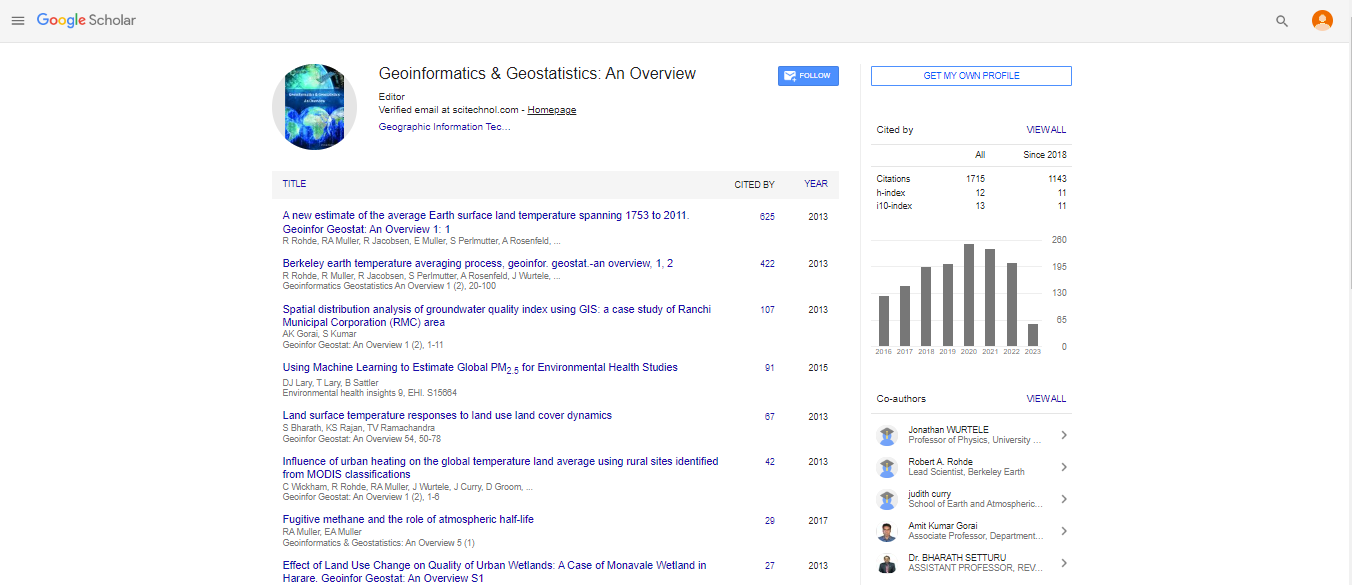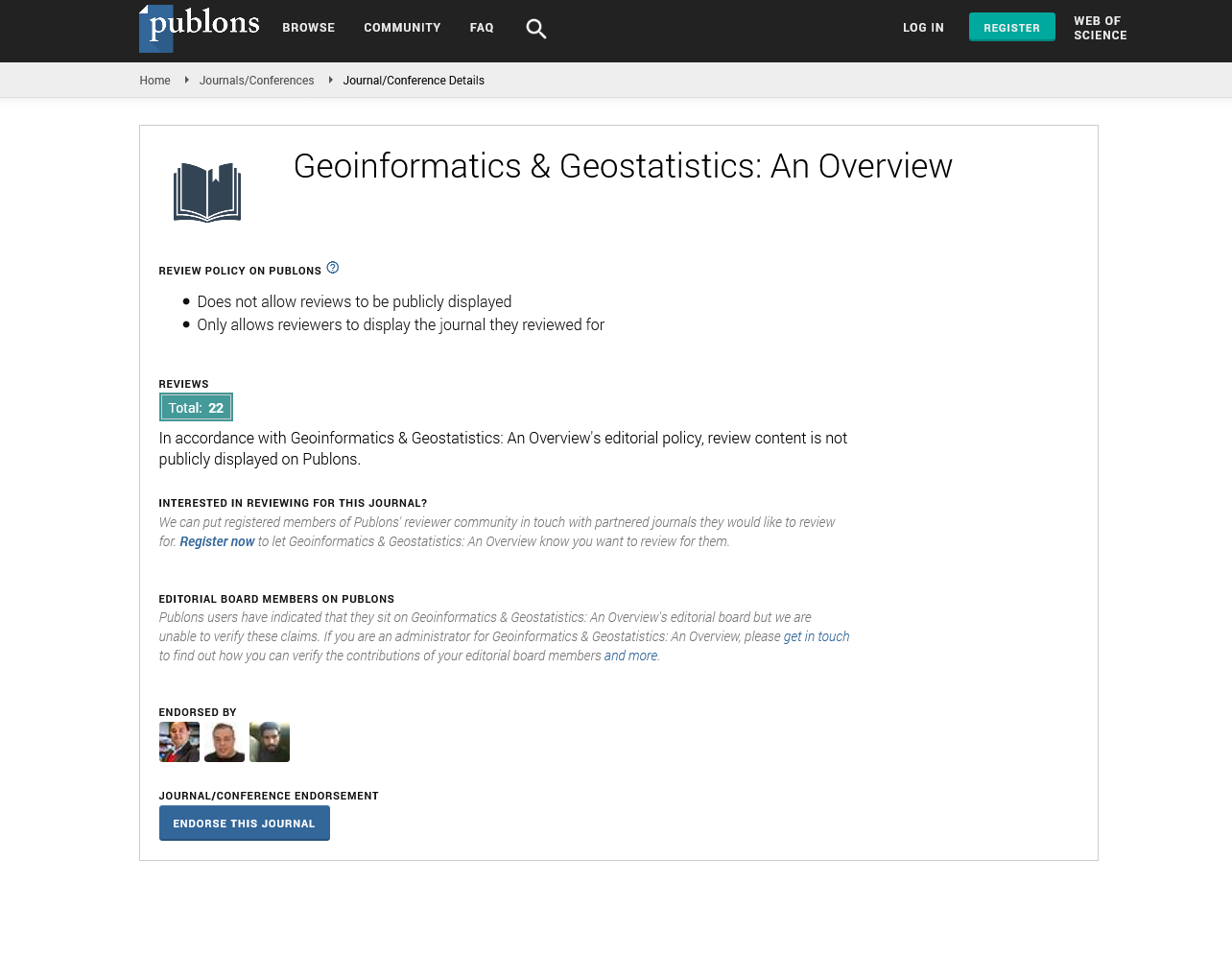Commentary, Vol: 11 Issue: 4
Geospatial Intelligence for Business and Market Analysis
Darren Suwannatrai*
1Department of Geography and Environmental Development, Ben-Gurion University of the Negev, Israel
*Corresponding Author: Darren Suwannatrai,
Department of Geography and
Environmental Development, Ben-Gurion University of the Negev, Israel
E-mail: Darrensuwa@bgu.ac.il
Received date: 31 July, 2023, Manuscript No. GIGS-23-113523;
Editor assigned date: 02 August, 2023, PreQC No. GIGS-23-113523 (PQ);
Reviewed date: 16 August, 2023, QC No. GIGS-23-113523;
Revised date: 23 August, 2023, Manuscript No. GIGS-23-113523 (R);
Published date: 30 August, 2023, DOI: 10.4172/2327-4581.1000347
Citation: Suwannatrai D (2023) Geospatial Intelligence for Business and Market Analysis. Geoinfor Geostat: An Overview 11:4.
Description
Geospatial Intelligence (GEOINT) is a rapidly evolving field with applications that extend beyond traditional domains like defense and security. Businesses are increasingly recognizing the value of geospatial intelligence for gaining insights into their markets, optimizing operations, and making informed decisions. This essay explores how GEOINT is transforming business and market analysis, providing companies with a competitive edge in the modern global economy. Location data is at the heart of GEOINT. It encompasses a wide range of information, from geographical coordinates and spatial relationships to demographic and environmental data. This information is invaluable for business and market analysis because it provides context and insight that traditional data sources often lack.
One of the primary ways businesses leverage GEOINT is by gaining a deeper understanding of their target markets. By analyzing location data, companies can identify where their customers are located, assess market potential, and tailor their marketing strategies accordingly. For example, a retail chain can use GEOINT to determine the most suitable locations for new stores based on population density, income levels, and competitors' proximity. This data-driven approach minimizes risks and increases the likelihood of a successful expansion. GEOINT also plays a pivotal role in competitive intelligence. Companies can use geospatial data to track their competitors' activities, assess their market share, and identify gaps in the market that they can exploit.
For instance, a fast-food restaurant chain may use location-based analytics to monitor the performance of rival establishments. By analyzing foot traffic patterns, they can identify which locations are thriving and which may be struggling. This information can inform decisions on marketing strategies, menu changes, and even potential acquisitions. Efficient supply chain management is crucial for businesses seeking to minimize costs and meet customer demands promptly. GEOINT enables companies to optimize their supply chains by analyzing the spatial aspects of their operations. By using geospatial analytics, businesses can identify optimal routes for shipping and distribution, locate warehouses strategically, and assess the impact of factors like weather and traffic on delivery times. This level of precision not only reduces operational costs but also enhances customer satisfaction through timely deliveries. Choosing the right location for facilities such as factories, warehouses, and data centers is a critical decision for many businesses. GEOINT aids in site selection by considering factors like transportation infrastructure, proximity to suppliers and customers, and environmental considerations.
Additionally, GEOINT supports facility management. For example, it can help identify maintenance needs based on the geographic distribution of assets or assess risks related to natural disasters or climate-related events, enabling proactive decision-making to protect business assets.
In the age of data-driven marketing, personalization is a key strategy for businesses. GEOINT contributes to this by providing insights into consumer behavior based on location data. Retailers, for instance, can analyze foot traffic patterns in their stores to optimize store layouts and product placements. Moreover, businesses can send location-based offers and promotions to customers' smartphones when they are in proximity to their stores, increasing the chances of making a sale. This approach not only enhances customer engagement but also improves the return on marketing investments. While the benefits of GEOINT for business and market analysis are substantial, there are challenges and ethical considerations to address. One major concern is privacy. Collecting and analyzing location data raises questions about individual privacy rights and data security. Businesses must implement robust data protection measures and comply with relevant regulations to mitigate these concerns. Another challenge is the potential for bias in data collection and analysis. If location data primarily represents specific demographic groups or geographic areas, it can lead to skewed insights. Companies must strive for inclusivity and diversity in their data sources to avoid such biases.
Geospatial Intelligence has emerged as a game-changer in business and market analysis. The ability to harness location data for market understanding, competitive intelligence, supply chain optimization, and customer personalization provides a significant competitive advantage in today's data-driven business landscape. As businesses continue to adopt GEOINT strategies, it is essential to strike a balance between the potential benefits and the ethical considerations surrounding data privacy and bias. By doing so, companies can unlock the full potential of geospatial intelligence while maintaining trust with their customers and stakeholders. In an era where location data is abundant and technology is advancing rapidly, GEOINT is poised to remain an essential tool for businesses seeking to thrive in an increasingly competitive and dynamic marketplace.
 Spanish
Spanish  Chinese
Chinese  Russian
Russian  German
German  French
French  Japanese
Japanese  Portuguese
Portuguese  Hindi
Hindi 
